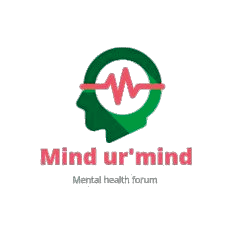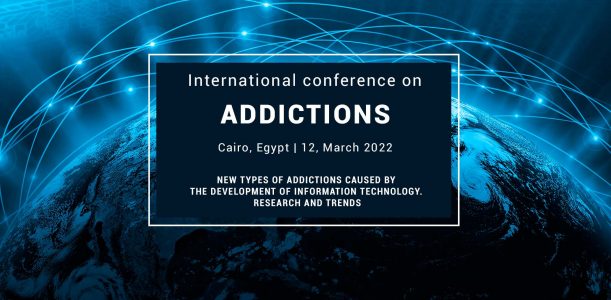
INTERNATIONAL CONFERENCE ON NEW TYPES OF ADDICTIONS CAUSED BY THE DEVELOPMENT OF INFORMATION TECHNOLOGY. RESEARCH AND TRENDS
DESCRIPTION OF THE CONFERENCE
The organizing committee of the International Association for the Study of Game Addictions is honored to invite all professionals and researchers working in the field of addictions to the international conference that is to be held in Cairo on March 12, 2022. The title of the conference is “New types of addictions caused by the development of information technology. Research and trends”.
The conference creates a platform for international interaction, exchange of experiences and ideas between the specialists who have devoted their professional activity to the study and development of effective methods of addiction treatment. We appreciate the cooperation also with all those who help people suffered from addictions to come back to a full and healthy life.
The event is very unique because it is devoted to a more in-depth consideration of precisely the new forms of addictions associated with the development of information technology: such as addictions to gambling and internet video games, in connection with a problematic social networks use, internet impulse purchases and other types of behavioral information addictions.
The prevalence of these forms of addictions has been expanding exponentially during the last 3-5 years, but the general public as well as professionals in their field, unfortunately, have not understood yet this phenomenon comprehensively as well as its negative consequences both for an individual and society.
Participation in this event will be useful and productive for all the addiction-related researchers, professors, doctors, addictologists, addiction counselors, addiction therapists, addiction psychiatrists, addiction specialists, mental health specialists, psychotherapists, clinical psychiatrists, psychologists, psychiatrists, students, graduates, and all consultants employed in addiction rehabilitation centers.
It is a wonderful opportunity for all to explore the international networking and collaboration with world-class professionals.
We are looking forward to working with you at the international conference “New types of addictions caused by the development of information technology. Research and trends” on March 12, 2022.

ABOUT THE CONFERENCE
The main aim of the conference is to take a more in-depth and detailed look at the information behavioral addictions – disorders that are not related to the influence of chemicals introduced from outside, but to the influence of the information technology and resultant products.
It includes gambling addictions, internet gaming disorders, problematic and pathological use of social networks, impulsive internet shopping, addictions to pornographic content, etc. Unfortunately, insufficient attention is paid to these disorders at various conferences throughout the world which are devoted to mental health and addictions, although they occupy the leading position and in most cases affect children, adolescents and young people under 35, developing very quickly, leading to severe negative consequences in all areas of life and destroying relationships. During Covid – 19 pandemic the situation aggravated and the number of addictions increased 3 – 5 times according to different studies. This tendency is understandable as people’s activities and communication, especially studies of students and pupils, have shifted to internet. In fact, it is becoming a global social problem of our time.
Behavioral addictions are known to be associated not with the use of psychoactive substances. At the first glance, these disorders look like a strong pathological urge to play games, to buy goods or services, to use excessively the social networks or to watch pornographic video content, with a loss of control over these behaviors, that is why these addictions are called behavioural addictions. However, in its essence, they are information addictions as they are caused by interaction of the information technology, like games, social networking algorithms, advertising or pornographic websites – with the human mind. To be more accurate, they are the result of sophisticated, aggressive and manipulative impact of these information products on the mind and the brain.
Consciousness is primarily the information phenomenon and all its cognitive functions (thinking processes, memory, perception, etc.) are intended for the information exchange only. The main uniqueness of such dependencies is manifested in the way that information in its pure form, without any effect of a toxic chemical substance, can become addictive.
Significant changes take place not only in behavior, cognitive functions, emotional and motivational sphere, worldview and personal values, but also in the structure and functions of the brain itself. In other words, severe addiction may appear as a result of mind functioning which could destroy the spiritual and intellectual potential of a person, ruin all his/her relationships and lead to a degradation of the individual. Moreover, this dependence by no means concedes to the dependencies on alcohol and drugs neither in its malignancy or speed progression (progredience), nor in its consequences, but in many ways even surpasses them.
In spite of the abundance of various research and scientific hypotheses, clinical observations, we still know very little about the structure of the pathogenesis of the gambling or gaming dependences, not to mention the clinical effectiveness of current therapeutic approaches. Taking into account the speed of development of information technologies and frequency of their use not for the purposes of assisting the individual but to his or her detriment, it is possible to predict a further increase of information dependencies. Game disorders (GD), internet gambling disorders (IGD) and social network addictions already prevail in a large scale, compared to all substance use disorders (SUD) all together, even if they are based on clearly underestimated official data. That is why it is so important to study them deeply and comprehensively.
Session 1
New types of behavioral information addictions. Relevance and prevalence.
Information technology has been developing at a tremendous pace over the last 20 years, and exponentially since 2015. In addition to their obvious usefulness and convenience, manipulative and destructive products and algorithms are created on their basis which can provoke the development of behavioral addictions. Dependence on a certain type of activity is at the basis of these addictions and control over it is lost by a human, both in terms of frequency of use and time spent. A pathological craving for being engaged in these activities appears and eventually increases to a compulsive urge, which is constantly carried out by a human almost without a struggle of motives. The pathological need becomes dominant, replacing all other interests, hobbies, kinds of activity and relationships end up with covering just the basic needs: food, sleep, child care, etc.
- Gambling disorder (GD)
- Internet gaming disorder (IGD)
- Social network sites (SNS) addiction
- Impulsive online shopping etc.
Session 2
Negative psychosocial consequences
Information behavioral addictions result in various and sometimes very serious negative consequences for mental and physical health of a human, personality, relationships with family members, friends, work colleagues, and are detrimental to exercise of professional activities and education, up to occurrence of a complete social maladjustment, commitment of suicides, and spiritual and moral degradation of the individual.
- Social negative consequences encompass:
– relationships
– education and professional activities
– financial and economic area
– legal repercussions
- Impact on physical health
- Negative consequences for mental health
Session 3
Pathogenesis and clinical features of information behavioral addictions
In spite of the abundance of various research and scientific hypotheses, clinical observations, we still know very little about the structure of the pathogenesis of information behavioral addictions. Over decades, studies have not identified a particularly vulnerable category of people prone to behavioral addictions.
The peculiarity of behavioral dependencies so far is associated with exercise of game activity and not with the use of psychoactive substances. On the surface, such disorders look like a strong pathological urge to play games, use social networks, watch pornographic content, do shopping online, etc., which dominates over all other needs, with a loss of control over these behaviors that is why these addictions are called behavioral addictions. However, in its essence and not in the form – they are information dependencies. They appear as a result of the interaction of information technology with the human mind.
The first and main uniqueness of these dependencies is manifested in the way that information in it’s pure form, without any effect of a toxic chemical substance, can become a cause of addiction with significant changes occurring not only in behavior, cognitive functions, emotional and motivational sphere, worldview and values of a person, but also in the structure and functions of the brain. In other words, very heavy addiction may appear as a result of the mind functioning that could destroy the spiritual and intellectual potential of a person, ruin all his or her relationships and lead to degradation of the individual.addictive syndrome: pathological urge to repeat certain behavior patterns, despite the negative psychosocial consequences as this activity becomes the dominant need;
– cognitive, emotional, and behavioral impairments (changes);
– impulsiveness and compulsiveness;
– altered states of consciousness (dark flow, flow state) in information behavioral addictions as a dependency factor;
– emotional dysregulation and chronic distress;
– astheno-depressive syndrome as a result of deep exhaustion of the central nervous system;
– other clinical manifestations.
Session 4
Neurobiological and neuropsychological research of information behavioral addictions
In order to understand the changes in the structure and functioning of the brain, to identify potential cognitive and brain disorders associated with behavioral addictions some neurobiological research is conducted.
- Neuropsychological – carrying out a variety of behavioral and cognitive tests / tasks for the study of disorders mainly focusing on executive functions. They are often combined with other methods, such as neuroimaging.
- Neuroimaging using MRI such as:
– the study of functional neural networks relations at rest (rsFC) may allow to identify dysfunction of neural circuits which is at the basis of various neuro-mental disorders;
– the study of functional connections in the brain when performing certain tasks;
– morphometric – structural and morphological changes in the brain are examined.
- EEG studies – electrical activity in various parts of the cerebral cortex which appears in the brain of people who suffer from gaming addictions.
- Neurochemical studies of changes in the synthesis of neurotransmitters using a PET
Session 5
Comorbid psychopathology
It is well known that people suffering from information behavioral addictions endure other mental disorders as well. Analysis of the available studies demonstrates a high degree of correlation between information behavioral addictions and anxiety, depression, Attention Deficit Hyperactivity Disorder (ADHD), social phobia/anxiety and obsessive-compulsive symptoms. Also, in the case of gambling addictions, the highest degree of comorbidity with psychoactive substance use was established.
The results of long term studies demonstrate bidirectional relationship between GD, IGD, SNS addiction and comorbid psychopathology by the type of mutual influence (strengthening or weakening of symptoms depending on the severity, or symptoms reduction of one of the diseases, respectively). The dependence and negative consequences increase, prerequisites for the development of a mental disorder in the form of emotional distress, for example, are emerging as well as the symptoms of a comorbid mental disorder or its symptoms become stronger if this illness already existed.
When healthy lifestyle activities was restored, the severity of symptoms of comorbid psychopathology also decreased.
– Mood disorders (depression and bipolar disorders)
– Anxiety disorders including panic attacks and social phobias
– Personality disorders
– Sleep disruption
– Substance-use disorders
– Eating Disorder
– Attention deficit hyperactivity disorder (ADHD)
– Irritability, aggression
– Obsessive–compulsive disorder
– Other mental health disorders.
Session 6
Manipulative information technology as a main risk factor for the development of addiction
Information behavioral addictions are the result of the interaction of information technology with the human mind. To be more accurate, they are the result of the sophisticated, aggressive and manipulative impact of those information products on the mind and the brain.
Session 7
The impact of manipulative information technology on a human and social development
- How does the involvement in online video games, gambling as well as problematic social media use affect the education of high school and college and university students?
- Involvement in online video games and gambling and sports. E-sports and sports betting as a risk factor of addiction.
- The impact of problematic participation in online video games, gambling, problematic use of social media, and other information behavioral addictions on human relationships:
– Conflicts
– Aggressive behavior and violence
– Loss of interest in social self-fulfilment among children, adolescents, and adults.
Session 8
Treatment and rehabilitation
In this session we will look at the effectiveness of different trends in individual, family and group psychotherapy in helping people suffering from various types of informational behavioral addictions. As well as effective methods of social and psychological rehabilitation.
Session 9
Effective prevention methods
The main purpose of this session is to initiate international discussion on effective methods of preventing information behavioral addictions. The current situation is very dangerous and a one-sided approach is predominant in the use of manipulative and aggressive technologies in the game industry, social networks, and advertising.
On the one hand, these technologies are intensively used, tested and implemented. Their design, software, and promotion strategies are constantly being improved. Large-scale marketing and neuromarketing research is being conducted. On the other hand, we face a very low awareness not only among the general public, but also among the scientific and professional community on realizing the harm and negative social and psychological consequences of participation in gambling and internet video games, the problematic use of social networks and the influence of advertising.
It is necessary to raise public awareness about the consequences of the above-mentioned activities, as well as to conduct large-scale multifaceted scientific research to initiate discussions and restrictions on the use of manipulative information technologies at the interstate level.
Session 10
How can changing the format of relationships in society from a consumer to a creative one solve the problem of informational behavioral addictions?
We face the fact that it is impossible in principle to solve the problem of the use and widespread proliferation of manipulative information technology in the consumer format of society. It is a multi-billion-dollar business that is supported at the governmental level around the world. Neither ethics, nor culture, nor religion can stop its exponential growth. Companies enrich themselves at the expense of lives and development of people, both children and adults. In the consumer format, material profit comes first, while in the creative format, human life and multifaceted development of a human is of priority number 1.
In the Creative Society we will be able to direct the potential of design production and programming of the game industry, social networks, and other internet resources to serve the purposes of development, learning, and uniting people. People will be able, through the development of information technology, to unite their potential quickly and efficiently, to exchange experiences, to share vital information, to find solutions to the most important problems, to accelerate learning and to grow in any desired direction.

REGISTRATION IS FOR FREE
EVENT ORGANIZER:

The event is organised by I-CONEX, a leading Egyptian agency specialized in event management and consultancy either locally or internationally to develop the most suitable business atmosphere for entities in different industries throughout the on-site or virtual events. I-CONEX aims to fill the gap between people and entities & market needs, it was founded in 2020 by Mr. Marwan Abd-El-Razek “CEO & Managing Director.”
Key Contact Person:
Diana Ihab “HR Head & Managing Director Assistant”
Contact number: 01280415050

OUR PARTNERS IN ORGANIZING AND HOLDING THE CONFERENCE:

Wellness Plus Foundation
Wellness Plus and the 100 Million Health initiative are organizing Integrated Mental health forum, bringing together policy makers, stakeholders, members, professionals & students to raise awareness about the wellness issue and discuss key topics related to mental health, and address the urgent need to put in place a comprehensive and proactive Mental Health Strategy.
The event will take place in the Greek campus 18th March 2022 @ Greek campus


CONTACT:
+ 0 128 041 50 50
+7 950 678 43 99
contact@iasga.info
tatjanazinchenko@gmail.com
EVENT LOCATION:
5 El-Fadl, Bab Al Louq Abdeen, Cairo
“Consoleya”



